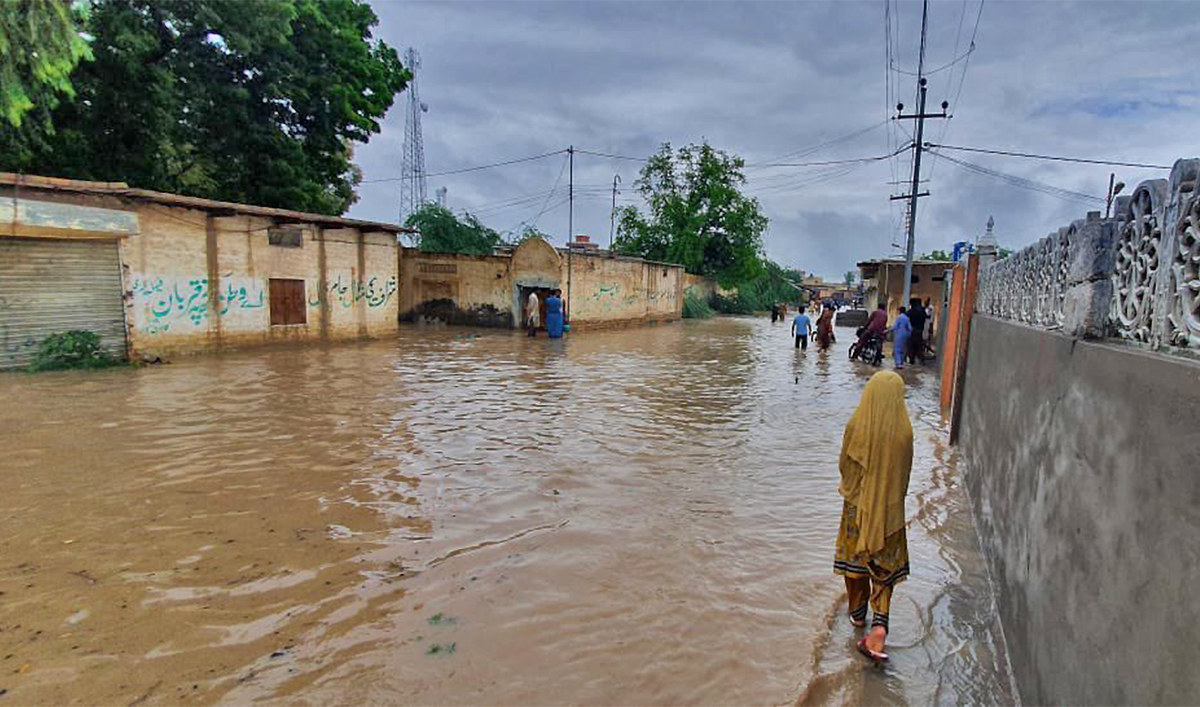KARACHI: The Pakistan Army has joined the civil administration in Sindh and Balochistan provinces in rescuing people affected by flash floods, the military said on Tuesday, after monsoon downpours wreaked havoc in several districts.
Torrential rains triggered flash floods in Sindh’s Jamshoro, Karachi and Gharo area as well as in Lasbela, Turbat and Quetta districts of southwestern Balochistan province, where several roads, bridges and houses have been destroyed since the beginning of the monsoon season last month, according to officials and residents.
The death toll from rain-related incidents across the country has jumped to 327 since mid-June, according to data compiled by the National Disaster Management Authority (NDMA). At least 102 people have lost their lives in Balochistan alone.
Army troops on Tuesday reached the flood-hit parts of Sindh and Balochistan provinces to rescue people trapped in their homes and help the civil administration carry out relief activities.
“Pakistan Army Emergency Response teams are consistently busy in dewatering and supplying basic food necessities and medical care to affected population,” the Inter-Services Public Relations (ISPR), the Pakistani military’s media wing, said in a statement.
“Pakistan Army dewatering teams are carrying flood relief operations in District Jamshoro, Gharo Grid station and South Karachi including Shahra e Faisal and Nipa Chowrangi, Lasbela, Turbat and Quetta.”
The army has established relief camps, including medical facilities, and distributed necessary rations, whereas various standby and response teams are stationed at various locations in Sindh and Balochistan for relief activities and to counter any emergency situation, according to the ISPR.
In Balochistan, Bela, a subdivision of Lasbela, has been cut off from the rest of the district due to floods.
“We fear that several villages on our eastern side, where flood waters come from mountains, may have suffered a lot of devastation, but we don’t have any contact with them,” Qaiser Roonjha, a resident of the area, told Arab News over the phone.
He informed the recent flash flood had also damaged the RCD Highway connecting Quetta and Karachi at seven different points.
Khalil Roonjha, a social activist, told Arab News on phone he was in Sandeman village where rainwater had inundated houses and damaged crops.
“Luckily, there has been no loss of human life, but the rainwater has submerged houses and destroyed everything,” he said.
“There are huge damages and the recuse work by volunteers has also become difficult due to continuous rain,” he added. “Our situation doesn’t get media coverage. Therefore, we find it difficult to get a response from the authorities as our houses get destroyed by flood.”

Motorcyclists navigate a flooded road after heavy rains, in Karachi, Pakistan, Monday, July 25, 2022. (AP)
Deputy Commissioner Lasbela Iftikhar Bugti did not respond to Arab News queries, saying he was in a meeting.
Farah Azeem Shah, a spokesperson of the Balochistan administration, said Lesbela was only one of the flood-affected areas while also naming other places like Dera Bugti, Suhbatpur, Naseerabad and Khuzdar.
“Prolonged and heavy rains have flushed away roads and bridges, making rescue operations difficult, but the Provincial Disaster Management Authority of Balochistan is carrying out its activities with the assistance of NDMA,” she told Arab News, adding the actual damages would be ascertained after the rain stopped.
Shah said more than Rs92.4 million rupees ($402,000) had been released for those who had lost their family members during the recent monsoon season in the province.
Meanwhile, Pakistan Meteorological Department (PMD) said on Tuesday the country’s southern port city of Karachi had received up to 217 millimeters of rain by Monday morning. The PMD director, Sardar Sarfaraz, told Arab News it was the heaviest downpour in the history of the city.

A girl walks through a flooded street in Lasbela, Balochistan, on July 25, 2022. (@QRoonjha/Twitter)
“Previously, the heaviest rain during a period of 24 hours took place at the PAF Base Masroor on July 26, 1967, which amounted to 211.3 millimeters,” he said. “So technically, the latest downpour in the Saddar neighborhood was the heaviest.”
He said the low-pressure area, producing extremely heavy rainfall across most parts of Sindh, was slowly moving and would cause more downpour until Wednesday.
“Analysis of the latest data indicates that this spell may continue until July 27 July,” the PMD director said.
About 30 houses were also partially damaged in Pakistan’s northwestern Khyber Pakhtunkhwa province due to torrential rains in the last 48 hours, while 15 were completely destroyed in floods, according to PDMA officials in Peshawar.
















